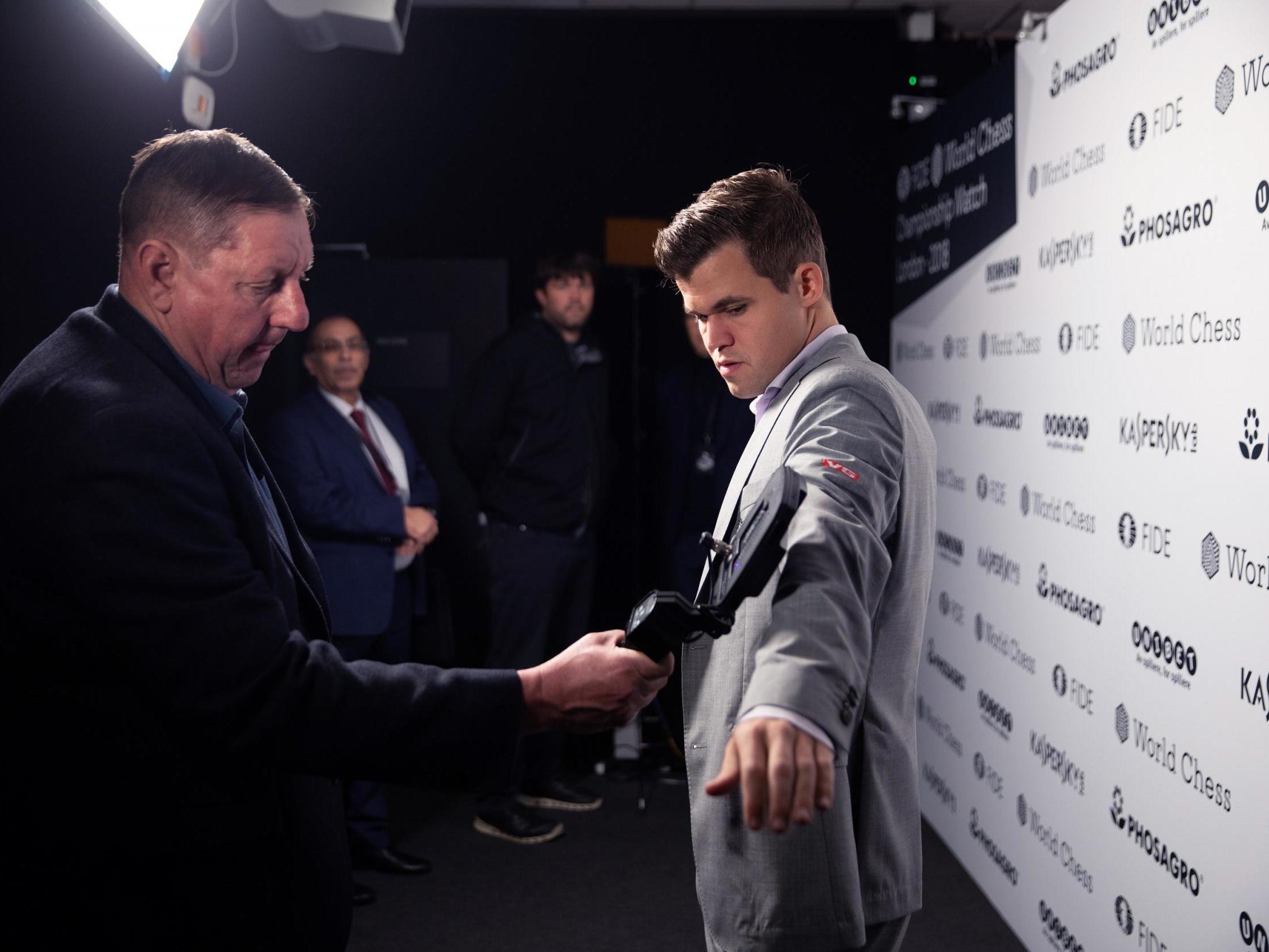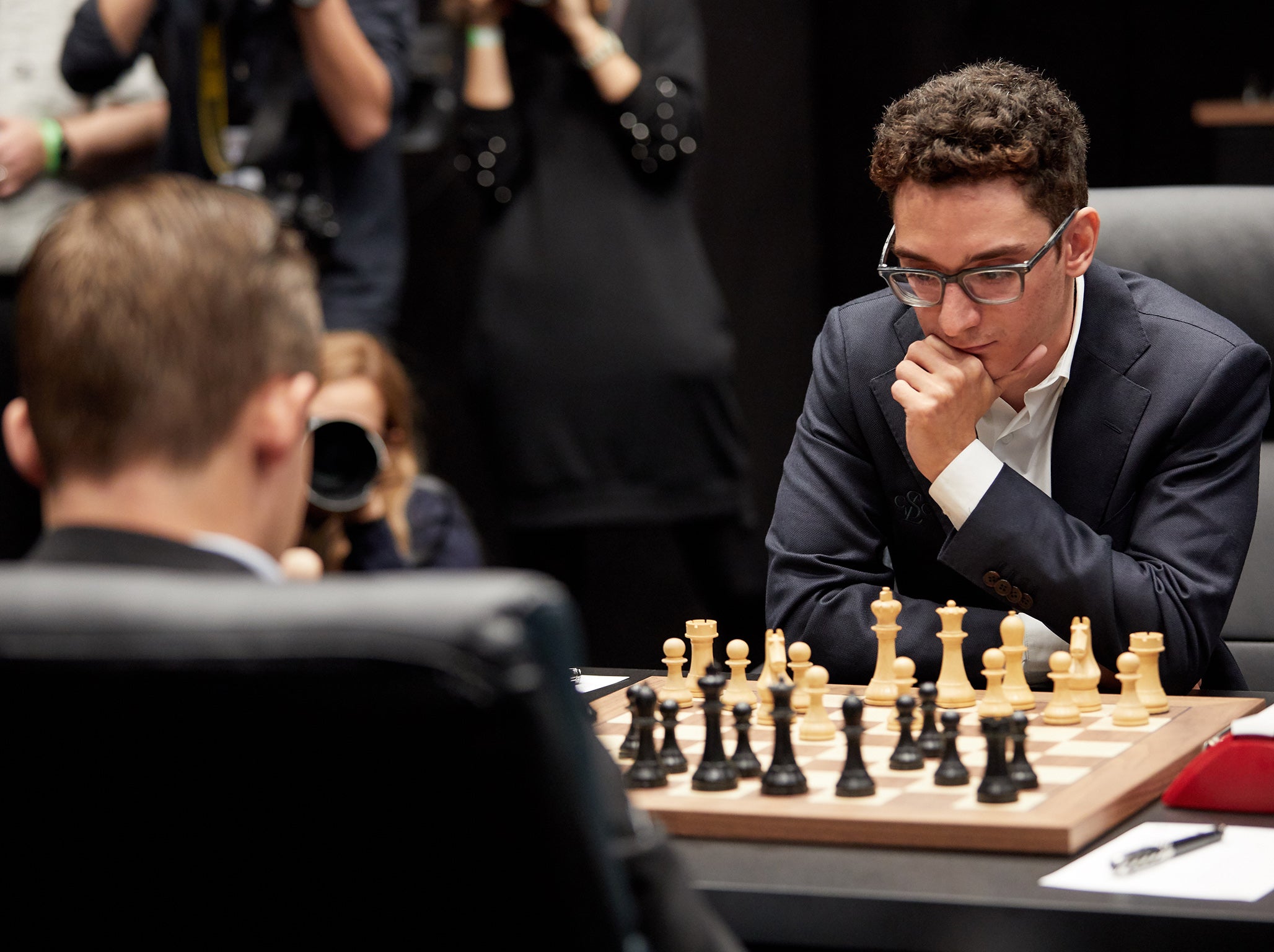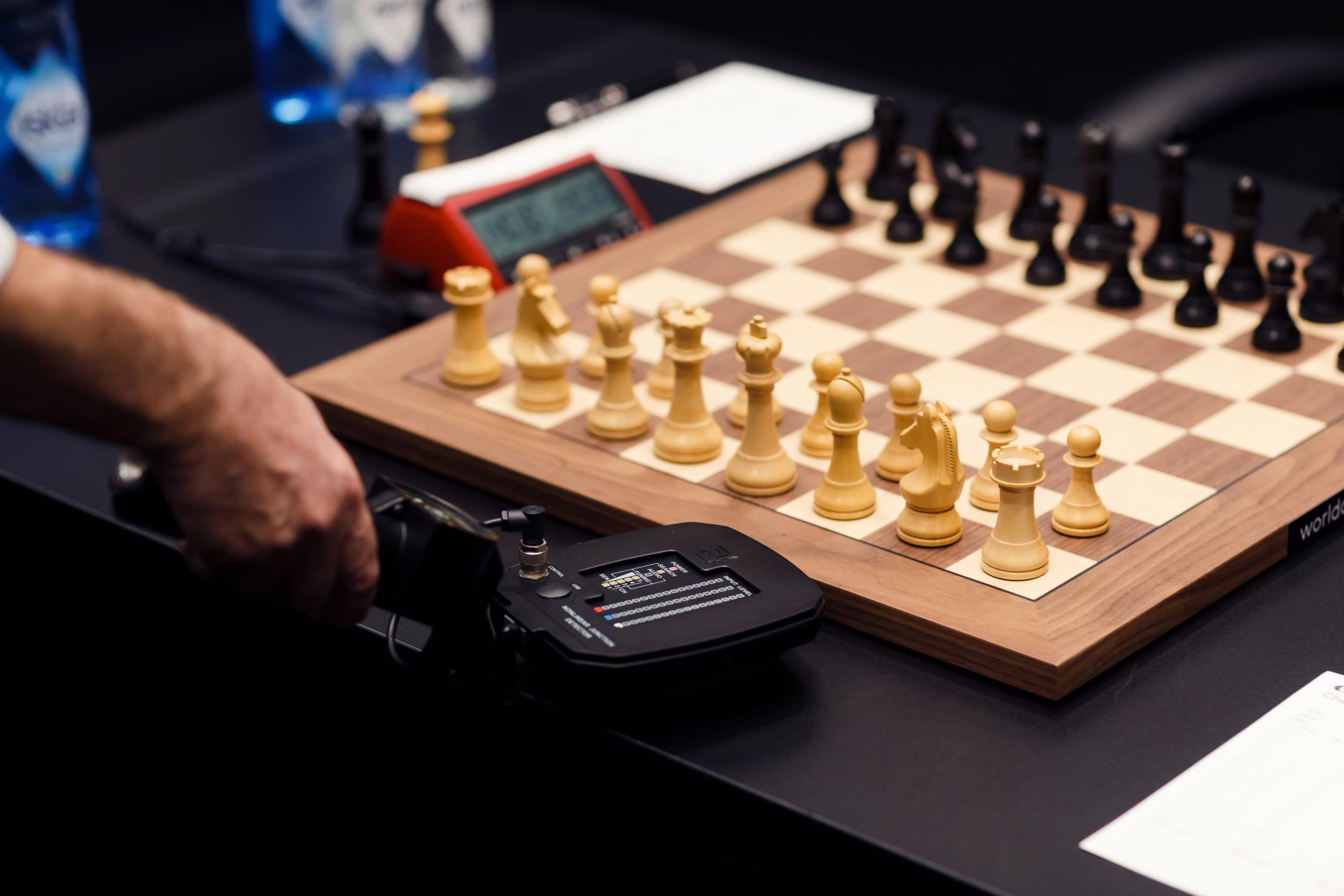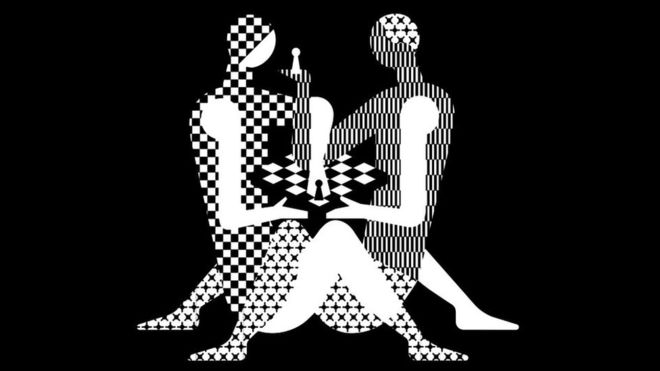Surveillance and the Kama Sutra: How chess’s fight against cheating became another way to make it cool
A sport that has struggled to harness commercial popularity ever since its Cold War heyday is trying to rebrand as something slick and cool, exclusive and elite, a sport to be desired, as Lawrence Ostlere discovers


In the bowels of a grand London building, where the ceilings stretch high above old marble floors, the World Chess Championship final between Norwegian grandmaster Magnus Carlsen and American challenger Fabiano Caruana is well under way.
Surrounding them is the most extravagant anti-cheating operation in the sport’s history. It monitors every shifting pawn, every twitch of the crowd, every vibration in the air. A security agent sweeps all four corners of their glass-box venue and hand-scans each player as they enter. Cameras train on every square-inch of the room and recording equipment listens for cues. Undercover “assets” are deployed among the audience, who sit in darkness behind six-inch-thick soundproof glass virtually blacked out from the inside. “It’s like a cool spy movie, isn’t it?” says World Chess CEO Ilya Merenzon, with a manic grin which suddenly comes and goes, not unlike a Bond villain. “They scan the hell out of it!”
Merenzon’s spy-movie analogy seems to fit. Carlsen has a certain Bourne-ish quality, with his sharp grey suit and silent, focused expression. Sometimes he leans back in his chair with one foot resting on the opposite knee and fingers pressed together, like he’s about to fire a loyal but incompetent henchman. Caruana is more tech-geek than movie-star but no less suave, with eyes narrowed through black glasses and chin resting on his hands like he knows some global secret.

Watching them upstairs in a swish room full of TV screens, fresh fruit and glamorous millionaires is Sergey Karjakin, who lost to Carlsen in the 2016 final. Is the military-grade surveillance necessary? “Cheating is a big problem in chess,” he nods. “Anti-doping is pointless but anti-cheating is important. Sometimes in small tournaments I joke with my friends: I sneak a phone into the match, and then give it to the arbitrators just to show that their security doesn’t work.”
In this ancient game of near-infinite possibilities – American mathematician Claude Shannon calculated it has more permutations than atoms in the universe – it is chess’s complexity which makes it so vulnerable to deception, in an age when computers are unbeatable. Yet if there’s one place where Karjakin’s phone trick wouldn’t work, it is surely the world of counter-espionage which seems to envelop this venue at The College in London.
THE GRANDMASTER
One of chess’s most high-profile cheating scandals was uncovered in 2015. Gaioz Nigalidze pulled off a meteoric rise from nowhere to win back-to-back Georgian Championships in 2013 and 2014, but in a tournament in Dubai the following year his opponent grew suspicious when he began taking regular toilet breaks.
Stranger still, his rival noticed that Nigalidze would head to the exact same cubicle with each visit. When officials investigated they discovered a mobile phone swaddled in toilet paper stashed behind a drainpipe. Nigalidze initially denied cheating but he was rumbled when the phone was opened to reveal his game being analysed in a chess app, and he later confessed.
Of all the security measures in place here, perhaps the most eyebrow-raising is the polygraph. On site every day is a former detective superintendent with decades of experience in the police and the military and with particular expertise in polygraph testing, who can be called upon should an accusation of cheating arise. According to research by the American Polygraph Association, this method of lie detection carries 90-95 per cent accuracy.

“It’s more widely used in the US, particularly in policing and law enforcement circles,” says the person in charge of the championship’s anti-cheating operation, Rory Lamrock, UK director of security firm Pinkerton. “The FBI use the polygraph heavily in background screening and recruitment of agents. It’s something unprecedented in high-level chess, and it’s something World Chess were really interested in.”
This, too, fits Merenzon’s desired image: nothing purveys the feel of a spy-movie like the idea of the winner of the €1m cheque being ushered into a windowless room and strapped to a chair connected to wires and monitors, as a former policeman demands to know why he moved his bishop.
THE COLLUSION
A particularly elaborate ploy was contrived by the French team at the 2010 Chess Olympiad. The French federation’s vice-president became suspicious when she came across a text between two of her players which read: “Hurry up and send me some moves.”
She soon uncovered a astonishing masterplan. One player would follow the match online and log each move into a powerful computer programme. He would text the optimum next move to his team captain in the tournament room, via a code disguised as a phone number. The captain would then stand next to a certain player in the room to represent a square to move from, and walk to another to represent the square to move to, and 19-year-old grandmaster Sebastien Feller carried out the plan on the board.
Chess authorities handed the texter, Cyril Marzolo, an 18-month ban; the captain and ringleader Arnaud Hauchard got a three-year suspension, while Feller, who won €5,000 at the tournament, was banned for two years and nine months.
At this point you might wonder what crimes Carlsen and Caruana had committed to warrant such scrutiny. The answer is none – their track records are squeaky clean. But then this story isn’t really about the two players in the glass box.
What this is really about is chess and its place in the world. It is a sport that has struggled to harness commercial popularity ever since its Cold War heyday in the 1970s, when Bobby Fischer vs Boris Spassky drew worldwide intrigue. Now World Chess is trying to rebuild and rebrand as something slick and cool, exclusive and elite, a sport to be desired – even to be regarded as sexy.
That would explain why World Chess spent several million pounds refurbishing The College in London so that it would have a venue befitting its global showpiece; and why it created its suggestive “Kama Sutra” logo depicting two bodies interlocked over a chess board, labelled “borderline pawnography”; why it has even developed its own version of Tinder, called Mates, where players flirt as they move.
And it also helps explain why the security operation resembles a Bond movie. Yes, it is partly to defend a sporting sanctity that cannot afford to be tainted, and partly to reassure its star players, says Merenzon – but then he also admits: “I know there are no cheats here.” Because another reason to invest in a polygrapher that almost certainly won’t be used is that high-spec surveillance fits with the allure the sport is creating for itself; the mission to catch cheats is almost a bluff in itself.
BLIND MAN’S BLUFF
The Norwegian chess community was stunned when an unknown player went on an extraordinary unbeaten streak in 2015, winning a national tournament just before Christmas. Stein Bjornsen was blind, and had been allowed to play with an electronic earpiece which he said helped record moves and follow play, but his feats began to garner national attention when some of his victims voiced their suspicions.
Even world champion Carlsen commented on the story, describing Bjornsen as a “really a unique talent”, before adding: “If everything is correct, and I hope it is.” Bjornsen went on TV to insist he was simply a voracious learner of the game, but he was exposed when chess officials put him in a sterile box and tested his skills. Bjornsen’s playing strength was measured well below his official rating and he was flummoxed by simple checkmate puzzles.
Bjornsen served a two-year suspension but when he returned to the board in 2018, he was filmed acting suspiciously while played against a talented 9-year-old girl. Her father recorded him constantly leaning on his left ear and, when confronted, officials discovered a bluetooth earpiece taped to his palm. Bjornsen again protested his innocence saying: “I didn’t cheat at all, I was just fiddling around.” But his excuses didn’t wash, and he was handed a lifetime ban.
Merenzon talks about chess not like a sport but like a cultural phenomenon. “Chess is a political experience, it’s going to church, it’s the Nobel Prize, it’s entertainment,” he says. “It’s traditional, but it’s also classic. It’s everything.” It is the last un-developed sport, he says, one which has the potential to become a billion-dollar business
Chess has an underlying popularity – “More people play chess than there are subscribers to Kim Kardashian’s Twitter,” Merenzon proudly points out – and he believes there is a considerable pool of sponsorship out there which is only now being realised; you start to see it when Carlsen notes down each move using a ST Dupont pen, the luxury French brand which sponsors the event – perhaps it is no coincidence that Dupont is also partnered with the Bond franchise.

The irony is that a game which requires such little resource to play beyond a lap and a busy brain is very deliberately positioning itself in a place of luxury and exclusivity, with its showpiece final locked behind pay-per-view subscription for most of the world.
Rebranding can only go so far on its own, of course; the sport itself needs to generate excitement too. Superstars like Carlsen are crucial and while it is impossible to forcibly recreate the USA-USSR rivalries of old, Merenzon is determined to write new narratives, describing Carlsen vs Caruana as the closest chess has ever come to Muhammad Ali to Joe Frazier.

Disputes over chess are as old as the game itself: King Canute is said to have killed his brother-in-law after an argument over a game in 1026. But in tackling cheating in the 21st century, the sport has spotted another opportunity.
For while in the modern age the code of integrity which chess holds dear may be harder than ever to preserve, it has now been turned into a commodity to be very publicly protected – with a sophistication which reinforces the game’s new, seductive and commercially attractive image.
Join our commenting forum
Join thought-provoking conversations, follow other Independent readers and see their replies
Comments
Bookmark popover
Removed from bookmarks